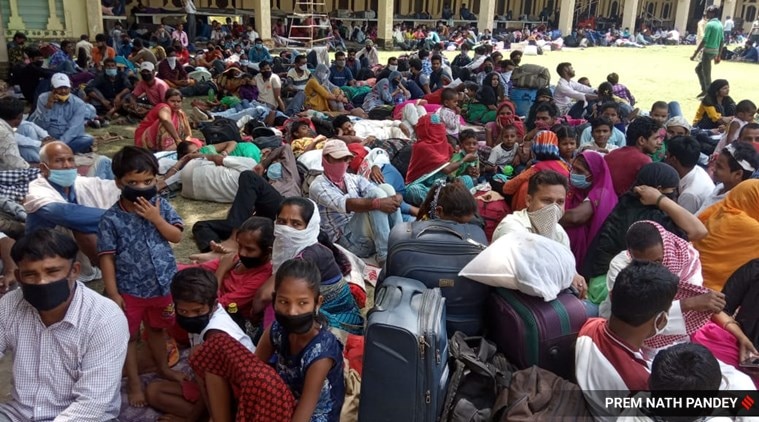 At 6.33 am at the Yamuna bridge, 30-year-old Ratnesh Chadar, a raj mistry working at construction sites in Haryana, sat with 13 members of his family, pleading with two policemen who had rounded them up. (Representational)
At 6.33 am at the Yamuna bridge, 30-year-old Ratnesh Chadar, a raj mistry working at construction sites in Haryana, sat with 13 members of his family, pleading with two policemen who had rounded them up. (Representational)
A flickering streetlight illuminated a dark stretch near the Ghazipur border as 28-year-old Raju Paswan hauled a trolley bag on which his one-year-old daughter was sleeping.
Around 3.30 am, they reached the border area after Paswan, his wife and daughter had walked over three hours from Delhi’s Mundka. They ran into a police checkpoint, where three personnel turned them away. Paswan, who worked at an auto parts unit earning Rs 500 a day, had just Rs 2,000 left. But he tried to offer a policeman Rs 500 note, only to be reprimanded.
“Where will we go? We have to get to Bhagalpur,” Paswan pleaded with the policemen, who stood their ground. The family turned back, thinking of how to find a way around the checkpoint.
Every night, several labourers who have lost jobs, homes and sense of security, travel across Delhi, navigating through police checkpoints, to get to the border. They say they don’t want to wait for a train to take them home — most are unsure when their turn would come — and fear the lockdown may extend indefinitely.
At 4.48 am, Vijay Sahu (29) sat on a pavement with 13 family members, carrying clothes, blankets and ration in discarded cement packets. His four-year-old son slept on his shoulder, while other family members chased after cars, begging for a lift. They used to work at an under-construction building in New Ashok Nagar for Rs 300 per day, and only got paid for 15 days’ work after the lockdown.
The group is headed to Allahabad on foot and have attempted this journey 15 times, only to be stopped by policemen. “This is the sixteenth time we are trying to leave. Every time we take long detours from New Ashok Nagar to reach the Noida border. In two months, we only got 2 kg rice, 2 kg atta and 1 litre oil. Will 13 people survive on this?” Sahu asked.
At 5.13 am, a group of 10 young men chased after tempo trucks and cars with plastic sticks, carrying rucksacks and empty water cans. They were construction workers in Haryana’s Rewari before the lockdown. The men left from Haryana around 5 pm on Thursday and walked through the night to reach Ghazipur border, where they were denied entry. Their final destination is Bhagalpur in Bihar, where none of them hold any land but hope to work in the fields.
Mohammad Sarfaraz (23) had just a day’s worth of ration left, which he carried in a white paint can. “All our money was spent in 18 days. We had to call our relatives back home for money. We are returning home with our heads hanging in shame,” Sarfaraz said.
Loknath (33) and his eight relatives left Haryana’s Bahadurgarh area with their mobile phones, clothes and empty water bottles tucked inside grey briefcases. They worked at a car cover sheets manufacturing unit making Rs 4,000 per month. They were not paid any salaries and were under the impression that train tickets were selling for Rs 3,000, so they decided to walk. They could not carry raw material like cloth, so they used that to make bright red face masks for themselves. “Our landlord kicked us out. First he cut our water supply and then the electricity. We have no option but to walk,” Loknath said.
At 6.33 am at the Yamuna bridge, 30-year-old Ratnesh Chadar, a raj mistry working at construction sites in Haryana, sat with 13 members of his family, pleading with two policemen who had rounded them up.
They had walked for three days from Rohtak, surviving on biscuits, until their three children, all aged below 10, grew exhausted. Ratnesh spent around Rs 520 on a cab driver who drove his children to Sarai Kale Khan.
Ratnesh explained to a constable about his stranded children, but the policeman told him, “Pyaar se nahi samjhe toh aur bhi tareeke maloon hain mujhe.” But Ratnesh and his family members stood their ground. “Bachon ke bina kahin nahi jayenge.”